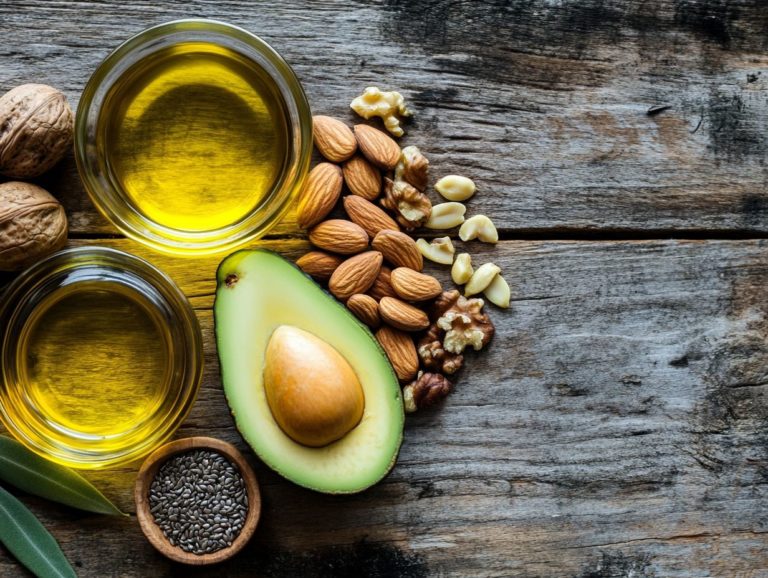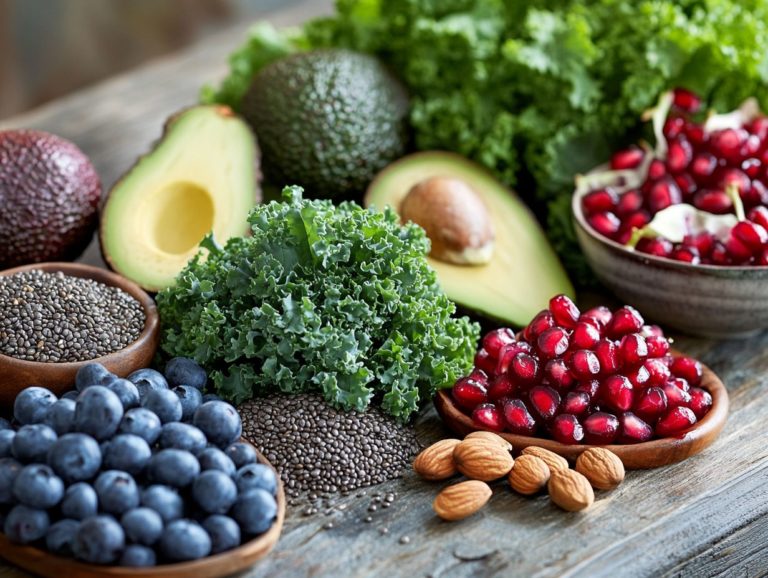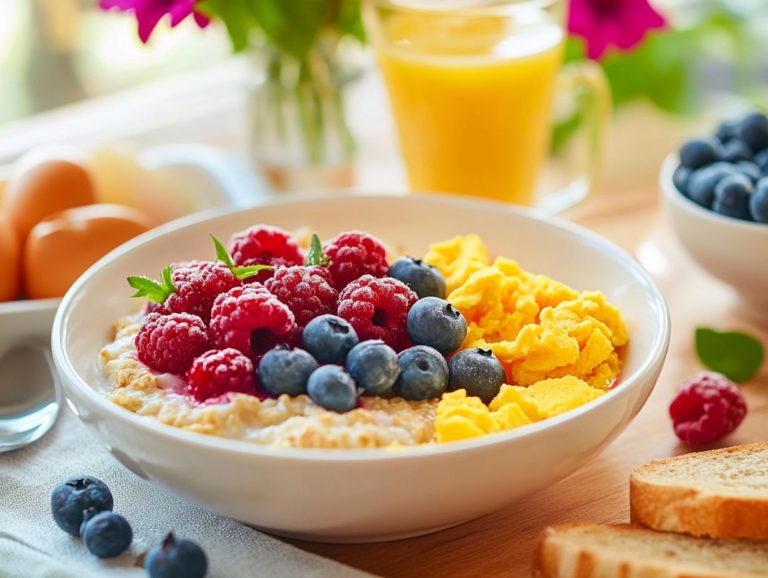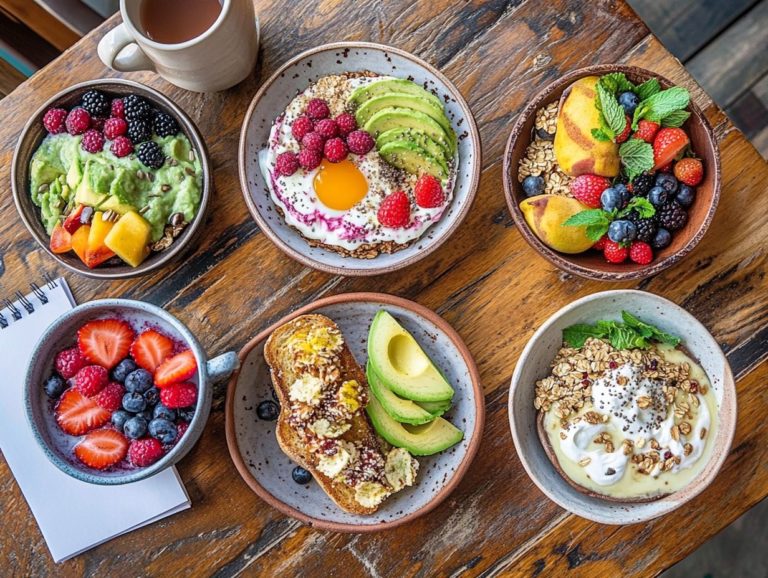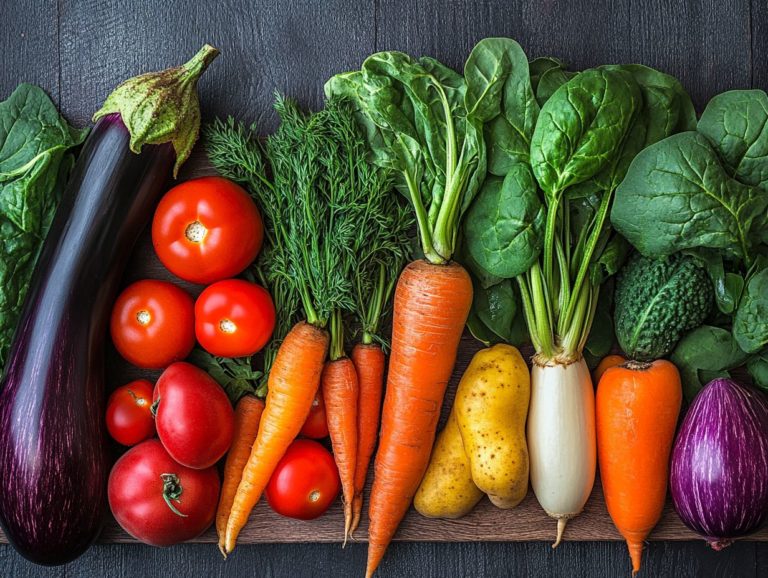Healthy Eating Habits for Seniors
As you age, maintaining a balanced diet becomes increasingly essential for your overall well-being. Healthy eating not only helps you manage existing health conditions but also enhances your energy levels, mood, and quality of life.
This article delves into the key nutrients vital for you, provides practical meal-planning tips, and addresses common nutrition issues you might face. It underscores the importance of incorporating physical activity into your daily routine for a truly holistic approach to health.
Start making simple changes today for a healthier tomorrow!
Contents
- Key Takeaways:
- Essential Nutrients Every Senior Should Know
- Healthy Eating Tips for Seniors
- Common Nutrition Concerns for Seniors
- Incorporating Physical Activity into a Senior’s Diet
- Frequently Asked Questions
- What are some healthy eating habits for seniors?
- Why is it important for seniors to have healthy eating habits?
- How can seniors ensure they are getting enough nutrients in their diet?
- What are some easy ways for seniors to incorporate healthy eating habits into their daily routine?
- What are some common challenges for seniors when it comes to maintaining healthy eating habits?
- Are there any specific diets or meal plans recommended for seniors?
Key Takeaways:

Eating a balanced diet with key nutrients is crucial for seniors to maintain their health and well-being as they age. Focus on meal planning, portion control, and incorporating healthy snacks to ensure you get the right nutrients in the right amounts. Physical activity also provides numerous benefits for both physical and mental health.
Why Healthy Eating is Important for Seniors
Healthy eating is vital for older adults, profoundly influencing overall well-being. It helps manage chronic diseases and enhances quality of life.
Nutrition serves as a cornerstone in preventing and managing conditions like high blood pressure and osteoporosis, which are common in this age group. By incorporating a diverse array of fruits, vegetables, whole grains, lean proteins, and healthy fats, you can ensure you receive the essential vitamins and minerals needed for optimal health.
Staying properly hydrated is just as vital; it supports digestion and cognitive function. Meal planning strategies can simplify your efforts to maintain a balanced diet, making grocery shopping and meal preparation easier.
Eating with friends and family can boost your mood and make meals more enjoyable!
Essential Nutrients Every Senior Should Know
Understanding essential nutrients is crucial for older adults, as their bodies have unique requirements for specific vitamins and minerals to sustain health and vitality.
Nutrients such as protein, vitamin B12, calcium, and potassium are important in supporting bodily functions and preventing deficiencies that could lead to health complications. It s vital for seniors to monitor sodium intake while ensuring a balanced diet that incorporates these nutrients.
Considering dietary supplements can be helpful for those who struggle to meet their nutritional needs solely through food.
Vitamins, Minerals, and Other Essential Nutrients
Vitamins and minerals are essential to your health as you age, acting as powerful antioxidants while supporting various bodily functions. Key vitamins like vitamin D play a role in maintaining bone health, while minerals such as calcium and potassium are vital for muscle and heart function.
Prioritize these nutrients to enhance immunity, fend off chronic diseases, and promote overall vitality. Incorporating a variety of foods rich in these nutrients will help you achieve a well-rounded and healthful diet.
For example, vitamin C is essential for collagen production and immune defense, while zinc is crucial for wound healing and cognitive function. Antioxidants, found abundantly in fruits and vegetables, combat oxidative stress, which significantly contributes to age-related ailments like arthritis and cardiovascular diseases.
By enjoying a colorful array of produce, you can optimize your nutrient intake, leading to improved energy levels and mental clarity. The synergy among these vitamins and minerals enhances absorption and utilization, highlighting the necessity of a balanced diet that includes diverse food sources.
Prioritize your health by embracing these nutrient-rich options.
In summary, maintaining a balanced diet rich in essential nutrients is crucial for seniors. By caring for your nutritional needs, you can lead a happier, healthier life.
Healthy Eating Tips for Seniors

Healthy eating tips can greatly improve the well-being of seniors. Meal planning and portion control are essential for achieving nutritional balance.
Prioritize protein-rich foods and fiber options, as these are vital for digestion and maintaining muscle mass.
Don t overlook your hydration needs; staying hydrated is crucial for overall health.
Understanding the effects of processed foods helps you avoid excess sodium and preservatives. By making informed choices, you can enjoy a healthier lifestyle that promotes longevity.
Meal Planning and Portion Control
Meal planning and portion control are vital for seniors to enjoy balanced meals. Organizing your meals in advance enables you to manage your nutrient intake effectively and avoid unhealthy snacking.
Recognizing appropriate portion sizes helps maintain a healthy weight while enjoying a diverse array of foods. This mindful approach supports your health and prevents chronic diseases linked to poor dietary habits.
Create a weekly shopping list based on your planned meals. This minimizes impulse purchases and ensures nutritious options are readily available.
Preparing meals in bulk and dividing them into single-serving containers saves time and makes it easier to enjoy wholesome meals throughout the week. Consider hearty vegetable soup or vibrant quinoa salad loaded with colorful veggies as great make-ahead choices.
By understanding portion sizes like filling half your plate with vegetables and limiting grains to a quarter you can refine your dietary choices and improve your overall health.
Healthy Snack Ideas
Healthy snacks boost your nutrition and keep your energy up between meals. Choose nutrient-rich options like fruits, vegetables, nuts, and yogurt to get essential vitamins, minerals, and protein.
Incorporating fiber-rich snacks can enhance digestion and create a feeling of fullness, helping you avoid overeating during main meals. Select nutritious options that align with your dietary needs and preferences.
Consider high-protein snacks like:
- Greek yogurt with berries
- A handful of almonds
These snacks aid muscle repair and sustain energy. Pairing hummus with carrot sticks or whole grain crackers provides a fulfilling choice packed with fiber and protein. Healthy snacks satisfy hunger while supporting heart health and overall well-being.
By planning ahead, you can easily include these nutritious choices in your daily routine, promoting a balanced diet that fuels your activities and enhances your quality of life.
Common Nutrition Concerns for Seniors
Seniors often face nutrition challenges that can impact their health, especially when dealing with dietary restrictions due to chronic diseases. Understanding these concerns is essential for effective healthy eating strategies.
Foodborne illnesses pose serious risks for seniors, making careful food handling and preparation paramount.
Being aware of the nutritional limitations imposed by various health conditions helps guide seniors toward appropriate dietary choices that support their well-being.
Take charge of your nutrition and health today!
Addressing Dietary Restrictions and Health Conditions

It is crucial to address dietary restrictions, especially if you manage chronic diseases. Consider your specific health conditions like diabetes, heart disease, or osteoporosis when planning your meals. This ensures you meet your unique nutritional needs.
Tailored nutrition tips can guide your food selections and meal preparation. This proactive approach supports better health outcomes and enhances your quality of life.
Consulting healthcare professionals is essential to identify your dietary restrictions. They can provide personalized guidelines tailored to your health profile.
If you have diabetes, focus on low-glycemic foods, such as whole grains, legumes, and non-starchy vegetables. These choices help keep your blood sugar levels stable.
If you are dealing with heart disease, include heart-healthy fats from sources like avocados and olive oil, while cutting back on sodium. This adjustment can be beneficial.
Explore alternative food sources to enhance dietary variety. Shifting towards plant-based proteins like lentils or chickpeas boosts your nutritional intake and adds excitement to your meals.
Emphasize flavorful herbs and spices, which enrich your dishes without excessive salt, ensuring that mealtime remains enjoyable and satisfying.
Incorporating Physical Activity into a Senior’s Diet
Get moving! Adding physical activity to your routine boosts your health and keeps you feeling great. Regular exercise offers numerous benefits.
Exercise improves mobility, strengthens muscles, and helps maintain a healthy weight. These factors can stave off chronic diseases.
By combining balanced nutrition with physical activity, you create a comprehensive approach to wellness. This promotes longevity and enriches your quality of life.
Aim to weave a variety of activities into your daily routine. This helps ensure that you remain active and engaged in life.
Benefits of Exercise for Senior Nutrition
Exercise presents a wealth of benefits for your nutrition. It creates a natural harmony with healthy eating habits.
Regular physical activity can significantly enhance your digestive health. This is particularly important as your metabolism may slow down with age.
Increased movement stimulates intestinal activity, alleviating constipation and fostering a healthier gut.
Exercise also helps regulate your appetite, making you less susceptible to overeating while nurturing your desire to nourish your body.
This balance is essential for effective nutrient utilization. A physically active lifestyle enhances your body’s ability to absorb vital vitamins and minerals, boosting your energy levels and enriching your overall vitality.
Frequently Asked Questions
What are some healthy eating habits for seniors?

Some healthy eating habits for seniors include incorporating a variety of fruits and vegetables into meals, choosing lean proteins, limiting processed foods and added sugars, and staying hydrated with water. For more tailored advice, consider meal planning for seniors.
Why is it important for seniors to have healthy eating habits?
Healthy eating habits help seniors maintain a healthy weight, reduce the risk of chronic diseases, improve energy levels, and support a strong immune system. Incorporating healthy eating habits for weight management can further enhance these benefits.
How can seniors ensure they are getting enough nutrients in their diet?
Seniors can ensure they get enough nutrients by following a balanced diet that includes a variety of foods from all food groups. Taking a multivitamin, if recommended by a doctor, and consulting a registered dietitian for personalized nutrition recommendations are also helpful.
What are some easy ways for seniors to incorporate healthy eating habits into their daily routine?
Easy ways for seniors to incorporate healthy eating habits into their daily routine include meal planning and prepping, choosing healthier options when dining out, and keeping healthy snacks readily available.
Take the first step toward healthier eating today!
What are some common challenges for seniors when it comes to maintaining healthy eating habits?
Many seniors face challenges like limited mobility, cooking difficulties, and fixed incomes. Changes in taste and appetite due to aging or medications can also make healthy eating tough.
Are there any specific diets or meal plans recommended for seniors?
There’s no one-size-fits-all diet for seniors. A balanced diet is key, and talking to a doctor or nutrition expert can help find what works best.

